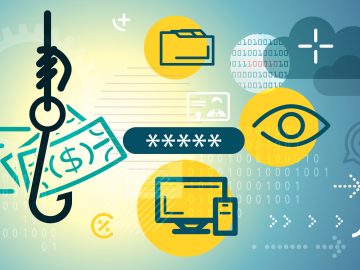Phishing is a sophisticated cyber-attack that we’re all vulnerable to. With just a few clicks, a hacker can gain access to all your personal information with this type of attack. Luckily, there are ways to avoid getting caught.
What Is Phishing?
Phishing earns its name from the bait-and-hook nature of the attack (the unique spelling is a homage to phreaks, an early term for hackers). The goal of a phishing attack is to gain access to the victim’s personal information. The attack can be initiated through an email or website where the victim may be coerced into sharing personal information or clicking on a link or download that installs malware onto their device.
For example, you may receive an email telling you about a settlement you’re eligible to collect a portion of. All you need to do is send over your bank account information and the funds will be transferred into your account within five business days.
Sometimes, hackers use familiar brands to facilitate their attack. In this situation, you may receive an email from Google, complete with their logo and contact information, asking you to update your password for security reasons. When you click on the link, you’re taken to a fake Google page where you’re asked to input your current password along with a new one.
In both cases, you’ve been tricked into willingly providing your information. And even if you think you would be able to spot these attacks before falling victim to them, hackers are stepping up their phishing tactics. Some attacks are tailored to your favorite activities and interests to avoid sounding any alarms.
A phishing attack can turn your world upside down. But there are steps you can take to avoid getting caught up in one.
The Dangers of Phishing Attacks
Hackers are getting smarter, and phishing attacks are causing more damage than ever before. See for yourself.
- Phishing accounts for 90% of all data breaches.
- 5 million phishing websites are created every month.
- According to Verizon, 30% of phishing messages are opened.
- Phishing attacks cost American businesses half a billion dollars every year.
These statistics prove that phishing is becoming common practice and that not everyone knows how to spot and protect themselves from an attack.
The consequences of falling victim to a phishing attack vary. If your information becomes compromised on a personal device, hackers can find ways to make unauthorized purchases in your name, move funds from your bank account, or steal your identity to take out loans and open credit cards.
A phishing attack can paralyze a company overnight. Businesses can experience severe financial loss and irreparable damage to their reputation after a successful phishing attack. In severe cases where client information is compromised, litigation is always possible.
These are just some reasons why learning how to prevent phishing attacks is a wise choice to make.
How to Prevent Phishing Attacks
The best defense against phishing attacks is to remain vigilant. But there are other proactive steps you can take to protect yourself.
First, learn how to spot phishing attacks and learn phishing lingo. If an email is requesting personal information while using generic greetings, containing bad spelling, featuring poor formatting, or including threats of legal action or an account shut down, it could be a phishing attack.
If you suspect you’ve received a phishing email or are on a website that isn’t what it appears to be, it’s time to do a little investigating. With emails, look for the email address, not the name popping up in your inbox. An email from Amazon will always come from an Amazon email address, not a generic one.
When checking links, make sure the address aligns with your expectations. If you expect to be taken to a company site but the address doesn’t match the brand name, proceed with caution.
Finally, let technology help you prevent phishing attacks. Avira offers you an Antivirus that protects you from ransomware, spyware, hacking, and phishing attacks. Best of all: it is free to download and implement. If you’re constantly spotting phishing attacks or just want to add an additional layer of protection to your device, it is a great option to consider.














